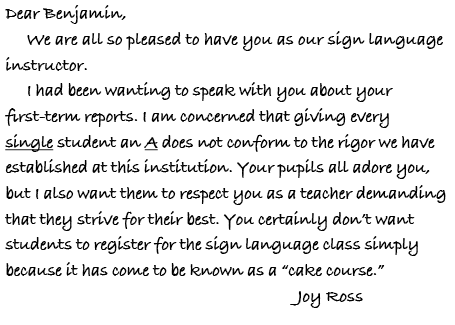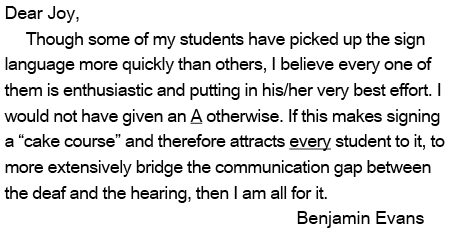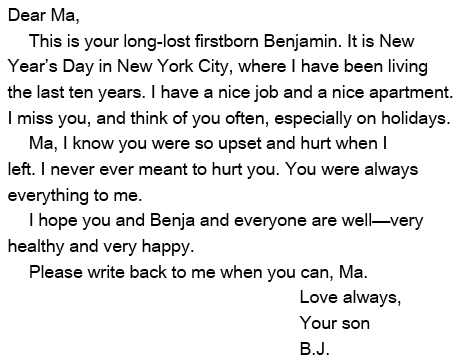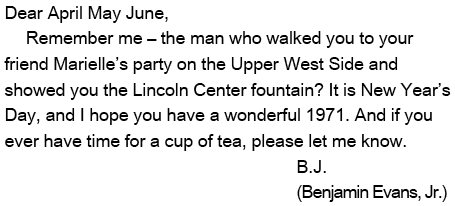The Castle Cross the Magnet Carter (60 page)
Read The Castle Cross the Magnet Carter Online
Authors: Kia Corthron
Tags: #race, #class, #socioeconomic, #novel, #literary, #history, #NAACP, #civil rights movement, #Maryland, #Baltimore, #Alabama, #family, #brothers, #coming of age, #growing up

Â
3
My last day of classes before Christmas break I receive a message from Joy. I wonder if students realize that teachers also live in mortal fear of being called to the principal's office. I have all my basic needs met from my superintendent career so losing the school position would not mean financial ruin. But I
enjoy
teaching.
When I walk in, she smiles and hands me a note.
 Â
Â
I read the note carefully, then scribble my reply. I imagine Joy is stealing glances at her watch so as I write I don't look up, as it would only embarrass both of us.
 Â
Â
As Joy reads the note, I see her laugh out loud. Then she turns the paper over.
 Â
Â
Two nights later, after a dinner of canned pea soup and saltines, I take my customary annual Christmas Eve stroll sixty blocks uptown and stand in front of St. John the Divine. I sip my deli hot chocolate and join a couple dozen other night wanderers waiting in anticipation on the steps of the Episcopalian Gothic Revival cathedral. The midnight bells. I know when they begin by the smiles on the faces of the others, the Merry Christmas embraces. I keep to the side, smiling myself, observing. When the doors open, I move quickly before the midnight service crowd comes pouring out.
Trekking home I pass a lit window at 92nd and Amsterdam. Apparently the tradition of this Hispanic family is to open gifts just after midnight. The children are in heaven, wildly tearing off the wrappings. The mother seems just as enchanted, the father sitting in his chair smoking, trying to smile but looking exhausted. I watch them for a quarter-hour before the chill forces me back on my way. The next evening I embark on my other holiday ritual, Christmas dinner at my favorite Japanese restaurant, but for some reason this year the establishment is packed, a line out the door. I sigh and pick up egg rolls at the corner takeout to eat at home alone.
As Hell's Kitchen is adjacent to Times Square, every New Year's Eve I plan on getting all that needs done early so I needn't leave my apartment past three. Darkness falls and I stare out my window, wondering if April May June might be among the swarms.
I never wrote her. When I came home that night, I taped her address to the free dog-photo calendar from my bank. I told myself I would dispose of the timetable on the day of its expiration, January 1, 1971, thus setting myself a fast-approaching deadline. But I nervously put things off and now, nearly a month since the evening I walked through Columbus Circle with a companion whose hands spoke to me with such vibrancy, I feel I've missed my chance.
At 11:30, I am inexplicably inspired to rush down into the multitudes. There was some attempt by the police to have barricaded out all latecomers, but this plan seems to have been overruled and I am shoved into the mob. People drunk and happy. I see screaming and broad laughter, I see horns blowing, it seems noisiness is an important part of the celebration. And then their lips: Ten. Nine. Eight. No one in my vicinity can see the lowering ball and still people are jubilant and in one moment they all cheer and embrace, and someone embraces me, and someone kisses me, and someone pours me a plastic glass of champagne which gets knocked out of my hand in the big crush but it's alright, I have not been embraced nor kissed nor touched other than anonymous accidental brushes on the sidewalk in over ten years, I am trembling and relieved they are all too inebriated to be aware of my tears.
It takes me half an hour for the five-minute stroll home. I walk into my apartment and pull out pen and paper.
 Â
Â
I couldn't have tasted more than a few drops of the spilled champagne and yet I feel drunk and merry, dreaming she will write back, that we will begin to correspond regularly, and I will invite her to visit me in New York, I'll pay her way and take her to the Statue of Liberty and the Empire State Building, to the theater (I live in the Broadway district and have never seen a show!), to Macy's and Gimbels and when she comes again in the spring we'll have a picnic in Central Park.
This optimism directly contradicts my apprehensions in recent years that my mother may have passed on. She would be sixty-nine now, a senior citizen, but then many people live to that age and beyond, and she had been a healthy fifty-nine when I saw her last. Had she wanted to contact me she couldn't since she had no idea where to reach me.
The second letter is suddenly easy after bolstering myself for the first.
 Â
Â
It's going on two, and I walk to the mailbox now because by postponing it until tomorrow I'd undoubtedly change my mind.
A cold January of periodic snow and sleet passes slowly. On the 27th, my Met tour group informs me they're interested strictly in nineteenth-century Impressionism. I smile as always and internally sigh: the request is a common one, and I am notably less taken with that particular movement coupled with that particular time period, so I cheat in a few van Goghs and Matisses, which garner no complaints since they are famous names.
On an early February Thursday I plod through slush, my feet soaked by the time I get to school. More than half my students are home with the flu, and the ones in attendance are irritable, embittered by the endless winter. I'm hardly in top form myself, my regular insomnia rearing its head with a vengeance the last week. By the time I leave for the day I have a pounding headache.
On the subway home I notice a card next to me. On one side are sketches depicting the manual alphabet, on the other side an appeal. I look up to see the deaf beggar laying cards next to the other passengers of the sparsely filled car. Many working deaf consider ABC peddlers a disgrace and would have given him hard looks and no money. He goes back to collect the cards, leaving them as a gift for those who offer him coins. I give him back his card along with a dollar. He signs Thank you and when I return You're welcome, he grins.
My migraine is worse on Friday despite the heaps of aspirin I've swallowed. In the afternoon I sit in the library reading
The Wretched of the Earth
. At 4:15 I leave, as my superintendent shift will start at five. While checking out the book, I realize I left my coat around my chair on the second floor. I go back up to retrieve it but it's gone. I had absently worn only a cotton shirt, no sweater, and now walk the twenty blocks home, the icy air penetrating my bones.
I stop by the drugstore to purchase a sleeping aid. I look over the various brands and decide to buy three large bottles, mixing and matching. The cashier eyes me suspiciously, and I present a warm smile to assure her how happy I am.
I'm shivering everywhere by the time I get to my building at 4:45. The entrance door has been left slightly ajar, meaning the lock is frozen again. I walk in, and am immediately greeted by a thick curtain of water falling hard from the lobby ceiling. I run through the wet cold wall and up to 2F, banging on the locked door but getting no response. I sprint upstairs to my apartment for the passkey, dropping the over-the-counter barbiturates in my living room, then race back down to 2F. The tub is overflowing, the apartment a flooded mess. I turn off the spigot. I notice folded clean towels in a laundry basket and I instinctually grab them, trying to sop up the liquid from the carpet, obviously damaged beyond repair. Minutes later, a fist slams into my back, the force of the punch pushing me forward, and I swing around to see the tenants, Mr. and Mrs. Wolinski, screaming at me. They are in their coats and dressed nicely, apparently returning from some afternoon formal event. The wife snatches her towels from my hands, the husband keeps pointing at the carpet and the ceiling, and it dawns on me they have astonishingly deduced that the whole mess originated in the apartment above. After much effort I manage to bring the couple to their bathroom, the source of the disaster blatant now, yet they seem determined to place the blame elsewhere. Finally I leave, the heat of their incessant screeching rage against my back.
I knock on Lloyd's door, who will likely be in trouble with the management if they find out he left before five. I leave a note, then go to my apartment, flop down supine on my bed.
Why would I think my mother would reply after all these years? Her last words to me, her last tearful screams enunciating every syllable to be sure I understood:
You betrayed your brother! You betrayed your family!
Six weeks today since I sent off those letters, a fool to open up all those old wounds again. And April May June. I remember she had planned to spend Christmas with her family but
no
job would tolerate holiday time-off to continue into February, she would have returned weeks ago and received my note. Well, the lack of response from her is less surprising. She may very well have a boyfriend, I don't know anything about her. And given my tardiness in writing her, all she knows about me is that I apparently have some emotional complications, and who would want to start any kind of relationship knowing that?
I take down my plastic green pitcher. Generally I have bad luck with sleeping aids, my insomnia so powerful as even to defy narcotics. Success may require a hundred pills so this is the plan. The plan is to pour the contents of all three bottles into the pitcher and to swill it, one gulp. To drink too slowly might mean I'd fall asleep before I have taken enough to not wake and the goal is to
not wake.
I stir, the water turning chalk white.
